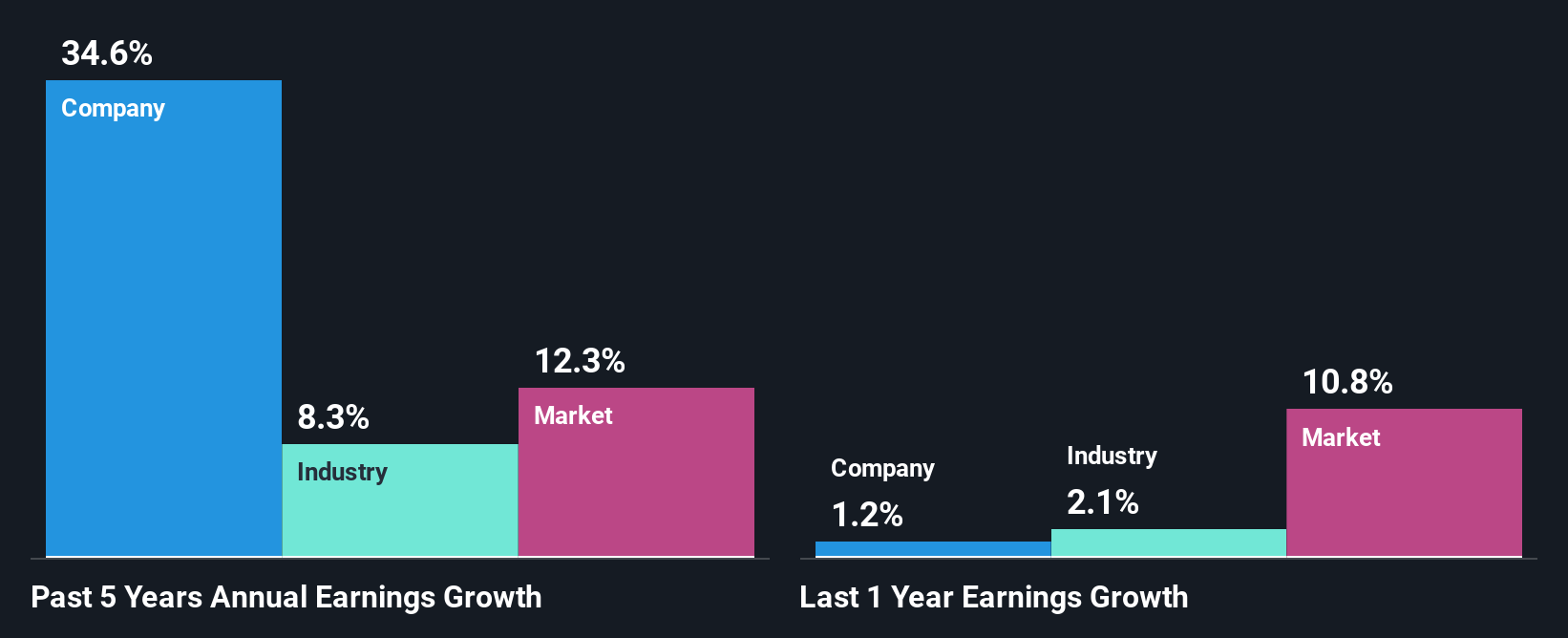Yamazaki Baking Co., Ltd. (TSE:2212) On An Uptrend: Could Fundamentals Be Driving The Stock?
Yamazaki Baking's (TSE:2212) stock is up by 5.6% over the past three months. Given that stock prices are usually aligned with a company's financial performance in the long-term, we decided to investigate if the company's decent financials had a hand to play in the recent price move. Particularly, we will be paying attention to Yamazaki Baking's ROE today.
ROE or return on equity is a useful tool to assess how effectively a company can generate returns on the investment it received from its shareholders. In short, ROE shows the profit each dollar generates with respect to its shareholder investments.
How To Calculate Return On Equity?
ROE can be calculated by using the formula:
Return on Equity = Net Profit (from continuing operations) ÷ Shareholders' Equity
So, based on the above formula, the ROE for Yamazaki Baking is:
8.3% = JP¥38b ÷ JP¥459b (Based on the trailing twelve months to March 2025).
The 'return' refers to a company's earnings over the last year. Another way to think of that is that for every ¥1 worth of equity, the company was able to earn ¥0.08 in profit.
Check out our latest analysis for Yamazaki Baking
Why Is ROE Important For Earnings Growth?
So far, we've learned that ROE is a measure of a company's profitability. We now need to evaluate how much profit the company reinvests or "retains" for future growth which then gives us an idea about the growth potential of the company. Assuming everything else remains unchanged, the higher the ROE and profit retention, the higher the growth rate of a company compared to companies that don't necessarily bear these characteristics.
Yamazaki Baking's Earnings Growth And 8.3% ROE
On the face of it, Yamazaki Baking's ROE is not much to talk about. However, given that the company's ROE is similar to the average industry ROE of 7.2%, we may spare it some thought. Looking at Yamazaki Baking's exceptional 35% five-year net income growth in particular, we are definitely impressed. Taking into consideration that the ROE is not particularly high, we reckon that there could also be other factors at play which could be influencing the company's growth. For instance, the company has a low payout ratio or is being managed efficiently.
As a next step, we compared Yamazaki Baking's net income growth with the industry, and pleasingly, we found that the growth seen by the company is higher than the average industry growth of 8.3%.

Earnings growth is an important metric to consider when valuing a stock. What investors need to determine next is if the expected earnings growth, or the lack of it, is already built into the share price. Doing so will help them establish if the stock's future looks promising or ominous. If you're wondering about Yamazaki Baking's's valuation, check out this gauge of its price-to-earnings ratio, as compared to its industry.
Is Yamazaki Baking Making Efficient Use Of Its Profits?
Yamazaki Baking's three-year median payout ratio is a pretty moderate 25%, meaning the company retains 75% of its income. By the looks of it, the dividend is well covered and Yamazaki Baking is reinvesting its profits efficiently as evidenced by its exceptional growth which we discussed above.
Besides, Yamazaki Baking has been paying dividends for at least ten years or more. This shows that the company is committed to sharing profits with its shareholders.
Conclusion
On the whole, we do feel that Yamazaki Baking has some positive attributes. Despite its low rate of return, the fact that the company reinvests a very high portion of its profits into its business, no doubt contributed to its high earnings growth. With that said, the latest industry analyst forecasts reveal that the company's earnings growth is expected to slow down. Are these analysts expectations based on the broad expectations for the industry, or on the company's fundamentals? Click here to be taken to our analyst's forecasts page for the company.
Have feedback on this article? Concerned about the content? Get in touch with us directly. Alternatively, email editorial-team (at) simplywallst.com.
This article by Simply Wall St is general in nature. We provide commentary based on historical data and analyst forecasts only using an unbiased methodology and our articles are not intended to be financial advice. It does not constitute a recommendation to buy or sell any stock, and does not take account of your objectives, or your financial situation. We aim to bring you long-term focused analysis driven by fundamental data. Note that our analysis may not factor in the latest price-sensitive company announcements or qualitative material. Simply Wall St has no position in any stocks mentioned.
 Wall Street Journal
Wall Street Journal